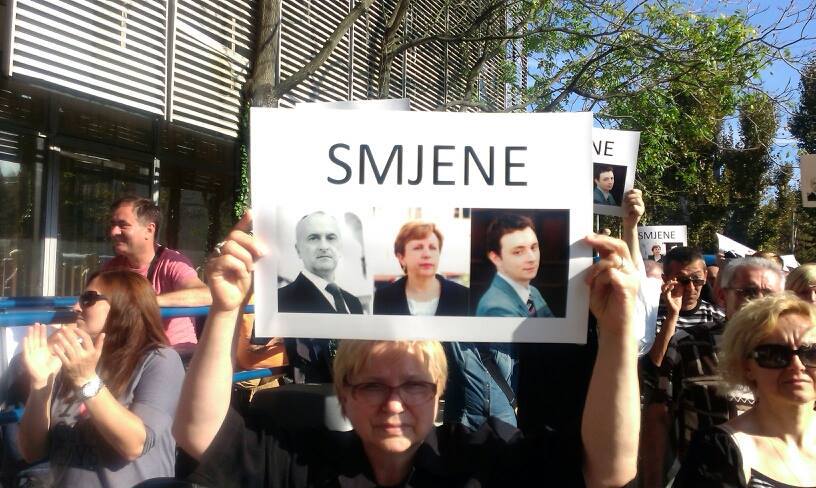 Since October 2014, Croatian war veterans have been camping in front of the Ministry dedicated to them. They are protesting against the government in power and requesting more rights for themselves – though, relatively speaking, they have been treated as a privileged group so far. How political is their protest? Ana Ljubojević gives an overview of this sensitive issue.
Since October 2014, Croatian war veterans have been camping in front of the Ministry dedicated to them. They are protesting against the government in power and requesting more rights for themselves – though, relatively speaking, they have been treated as a privileged group so far. How political is their protest? Ana Ljubojević gives an overview of this sensitive issue.

When in mid-October 2014 a group of one hundred Croatian war veterans (branitelji) protested in front of the Ministry that carries their name – Ministarstvo branitelja – nobody expected it to still make news in seven months time. And yet, 222 days later, this ongoing protest culminated in an open clash with the police on St. Mark’s square in Zagreb, in the immediate proximity of the Croatian government’s headquarters.
Veterans’ protests are not a new phenomenon in Croatia. The first, and certainly most famous one, took place in Split back in 2001: a rally in support of then ICTY indictee Mirko Norac, who is now a convicted war criminal. In that occasion Ivo Sanader, acting as leader of the right-wing party HDZ (Croatian Democratic Union), gave a famous speech against the SPD-led coalition government and its policy of collaboration with the ICTY. Veterans protested in 2005 against the arrest of General Gotovina, in February 2011 against the arrest of Tihomir Purda, and two months later branitelji expressed their support for the Croatian Generals sentenced by the Hague tribunal. Rallies against minority language policies in Vukovar were carried out throughout 2013.
Contradicting excerpts from Ivo Sanader’s speech at the Split Riva in 2001 (“no country would give up its heroes”), and later on, as PM, supporting Croatia’s collaboration with the ICTY.
The official leaders of the latest stream of protests are Đuro Glogoški, president of the Association of 100 Per Cent Handicapped Croatian Defenders and Josip Klemm, president of the Association of veterans of the special police and director of a security company. The original request of the protesters was the ousting of Minister Predrag Matić, of his deputy Vesna Nađ and of his assistant Bojan Glavašević, triggered by an unfortunate comment Glavašević made at a conference in Vukovar. However, this event proved to be just a trigger for a much deeper crisis. Hence, instead of aiming for concrete amendments to the Act on the Rights of Croatian Homeland War Veterans and their Family Members, the protest became more and more political and anti-Government oriented.
The outcome? Since last October, branitelji have been camping in an (illegally) built tent in front of the Ministry, demanding a dialogue with the Government. In spite of several visits from state officials and a meeting with the President of the Sabor (the Croatian Parliament), to whom the protesters gave notice that Minister Matić should be fired before any meaningful negotiations could start, last Friday the veterans occupied St. Mark’s square determined to remain there until “the PM [Milanović] receives them”. After dramatic attempts of the police to remove protesters from the square, the latter sought refuge in a church, protected by the local priests and by Vatican agreements signed between Croatia and the Holy See in 1997. Still, no legal action is to be expected against the veterans, on the contrary – PM Milanović met the veterans twice, together with Ministers Matić and Kotromanović. None of the meetings solved the deadlock.
Excerpts from branitelji’s recent protest actions in Zagreb, Croatia
When speaking about branitelji, we do not actually take into account the whole of the 503,112 individuals who, according to the official Registry of Croatian veterans, fought in the Homeland war. The broad category of war veterans consists of many heterogeneous groups. As outlined during the workshop “Representations of branitelji in public discourse and popular culture” organised at the Faculty of philosophy in Zagreb on 21 January 2015, there are 556 war veterans associations and 1276 NGOs dealing with the legacy of the Homeland war.
Government policies towards the veteran population in the 1990s created dangerous preconditions for their scarce integration into Croatian society. A 2003 comparative study (authored by Ferenčak, Kardov and Rodik and commissioned by the Ministry of Defenders itself) confirmed that veterans’ rights in the country are already quite extensive, putting Croatia ahead of South Korea, Israel, United Kingdom and Spain. And yet, the process of reintegration of branitelji into society is facing considerable difficulties. Stubbs and Zrinščak argue, in a forthcoming paper for European Policies and Society, that the existing aid programmes are lacking evaluation, and that the “system is based on passive, ‘compensational’ approach”, while other scholars have suggested that welfare system for the veterans should shift from mainly remunerative to more integrative ones.
“In the immediate post war period, the Government chose to offer a retirement stipend to war veterans, many of them in their early thirties, instead of aiming to improve their employment level”, explained a researcher from Documenta who wished to remain anonymous. “The veterans are somehow excluded from the social struggles of the rest of the Croatian population”. The average pension of a war veteran is 5013 kn after tax, which is a considerably higher allowance (around 50% more) than the pension gained after 40 or more years of employment, according to the Croatian Pension Insurance Institute’s data. A disabled war veteran receives, on average, a 2.5 times higher pension than a civilian with the same degree of disability.
Thus, even though the protesting veterans refuse to be pinned down as supporters of any particular political party, their organisations do function – in the words of Stubbs and Zrinscak – as “powerful networks exercising political agency on a wide range of political issues”, often expressing their loyalty to conservative right-wing political actors, such as HDZ. The policies of the 1990s, so beneficial to the veteran population, de facto created a new segment of society, whose actions have ever since frequently coincided with those of the HDZ, regardless of the government in charge. Consequently, branitelji are accused of preparing (or supporting) a coup d’état or of similar actions inviting the overturn of a legally elected government.
Regardless of whether this is true or not, it cannot be denied that veterans are starting to lose popular support. In a survey commissioned by the RTL television channel, the majority of Croatian citizens do not support the veterans’ protest. An alternative demonstration, this time against the veterans, was organised in February 2015, and even some members of the veteran population have publicly distanced themselves from the protests.
Although the status quo was maintained after the meeting with the Government and the veterans’ protest resumed, it is becoming apparent that the branitelji question is becoming less and less of a social taboo topic in Croatia. The upcoming months of this electoral year for Croatia will most certainly tell us more about the ways in which the country is dealing with the social dimensions of its war traumas twenty years after the end of the 1991-1995 conflict.
Note: This article gives the views of the authors, and not the position of LSEE Research on SEE, nor of the London School of Economics.
_____________________
Ana Ljubojević obtained her PhD in Political systems and institutional change at the Intitute for Advanced Studies in Lucca, Italy. Her thesis examined the impact of war crime trials on historical narratives in Croatia and Serbia. Currently, she is taking part in the research projects”International Criminal Tribunals as actors of domestic change” at the University of Social Sciences and Humanities in Warsaw, Poland and “Framing the nation” at the University of Rijeka, Croatia.


